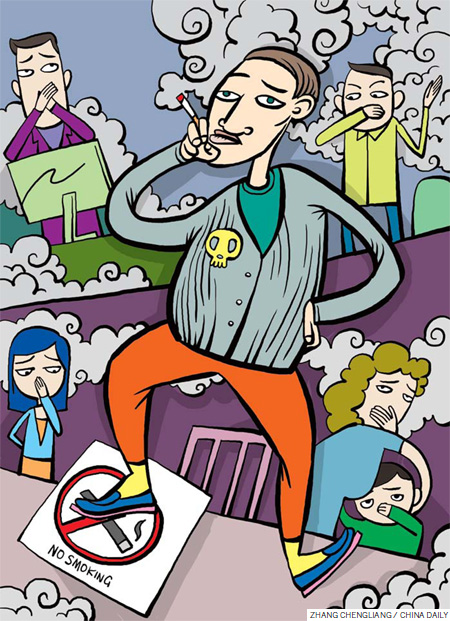Pulse
There's no smoke without ire
(China Daily)
Updated: 2011-05-09 08:02
 |
Large Medium Small |

Ban on lighting up in public could help people quit the habit, but it will be slow going
A smoking ban issued by the Ministry of Health came into force on May 1. The prohibition forbids smoking in public venues, which is interpreted to include restaurants and bars, as well as hotels and public transport. However, it won't impact on smoking in the workplace, said Jiang Yuan, deputy director of the National Office of Tobacco Control.
At face value, the ban appears to be good news, especially for non-smokers. There are as many as 300 million smokers on the Chinese mainland, with the number who die from smoking-related illness accounting for one-fifth of the world's total - an incredible 1.2 million a year, according to the World Health Organization. One would hope a ban would help provide a decent incentive for some of these smokers to quit when they are no longer able to smoke as easily in public.
Equally, the remainder of the population are regularly exposed to secondhand smoke. While smokers choose what they inhale, many who wish to enjoy a meal or a drink but don't wish to smoke still end up breathing it in anyway, and their clothing ends up smelling of stale smoke.
Indeed, "the ban, if well implemented, will effectively protect non-smokers from smoking", said Wu Yiqun at the ThinkTank Research Center for Health Development, a non-governmental organization. Sadly, as it stands, this does seem to be where the ban needs improving.
At this time there are no specific penalties laid out for offenders caught breaching the ban and it's unclear at present as to who will have the responsibility for enforcing it. Considering the current circumstances, the ban can "hardly work well" in Jiang's opinion.
A great number of signs swiftly appeared outside bars and restaurants across the capital during the first weekend after the ban came into force, but it didn't seem to deter anyone. Many still smoke where the ban is not being enforced effectively, with restaurant owners stating that there is little they can do about it. Many Beijingers also seemed unaware that a ban had even been enacted.
Being something of a critic of the smoking ban in my native Britain when it was introduced, it did regardless appear to have a positive impact. It seemed that a ban would be unfair, simply alienating smokers from entertainment options and doing little more for public health than the dedicated smoking and non-smoking sections already achieved.
However, it also encouraged half of smokers to smoke less. There was a 5.5-percent drop in the number of smokers in the nine months after the ban and a 2.4-percent reduction in hospital admissions for heart attacks the following year, the BBC reported.
If the option to smoke while eating and drinking at social events in public venues is removed in Beijing, one would imagine smoking opportunities would vanish and many smokers may end up quitting. Smokers often cite their friends' influence at bars and restaurants as a source for continuing their habit.
Smoking is immensely popular in China, some even suggesting it is a tradition in certain scenarios. Many businesses are concerned an outright ban will harm their trade. They have little need to worry for the time being, though, as with limited scope for penalties and enforcement, it seems customers will continue smoking regardless of the ban.
The author is a British freelance writer based in Beijing. To comment, e-mail metrobeijing@chinadaily.com.cn. The views expressed here do not necessarily reflect those of METRO.
(China Daily 05/09/2011)
| 分享按钮 |